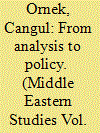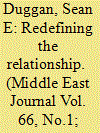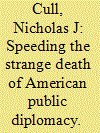|
|
|
Sort Order |
|
|
|
Items / Page
|
|
|
|
|
|
|
| Srl | Item |
| 1 |
ID:
115332


|
|
|
|
|
| Publication |
2012.
|
| Summary/Abstract |
Turkish area studies in the US developed in parallel with the diplomatic rapprochement between Turkey and the US after the Second World War. This article scrutinizes the relation between Turkish studies and American public diplomacy in Turkey with special emphasis on the latter. Unlike cultural programmes in Europe, which focused on satisfying intellectuals' taste for high culture, in Turkey the concentration of the cultural activities was on bureaucrats, educators and technical personnel. The article argues that this was because of a modernization approach and the priority given to the needs of US aid programmes. Following the revolutions in Asia, the programme was further oriented to strengthen the collaboration between Americans and the technocratic elites of Turkey.
|
|
|
|
|
|
|
|
|
|
|
|
|
|
|
|
| 2 |
ID:
111227


|
|
|
|
|
| Publication |
2012.
|
| Summary/Abstract |
This article traces the US military's foray into public diplomacy (PD) in Iraq since 2003. The military initially assumed PD responsibilities, traditionally a civilian activity, in order to inform the Iraqi people about its wide-ranging reconstruction and development activities. But as the American occupation continued, the military's overwhelming presence throughout the country, its human and financial resources, and its organic transportation and security capabilities assured that it continued to dominate PD activities over the next eight years. As the military completes its withdrawal from Iraq, this article will outline the strengths and weakness of public diplomacy as practiced by the US military, the State Department, and Provincial Reconstruction Teams (PRTs).
|
|
|
|
|
|
|
|
|
|
|
|
|
|
|
|
| 3 |
ID:
095516


|
|
|
|
|
| Publication |
2010.
|
| Summary/Abstract |
The Reagan administration knew how to throw a great party, and the celebration held on November 17, 1988, in the Organization of American States building in Washington, DC, was no exception. Stretch limos jammed that part of town. Guests included media mogul Rupert Murdoch and the president himself. The gala dinner honored the achievement of Charles Z. Wick, who had served throughout the Reagan years as director of the U.S. Information Agency (USIA).1 Originally established by Eisenhower in 1953, USIA conducted the U.S. government's public diplomacy: advancing foreign policy by engaging foreign publics through radio, press work, exhibitions, publications, cultural exchanges and a host of other channels. Wick's achievement was impressive. USIA had been a key part of the Reagan era's ideological barrage against the Soviet bloc, telling the world about the shooting down of the Korean airliner KAL 007, telling the people of the Soviet Union about the meltdown of Chernobyl, and mobilizing just enough European sympathy to allow the deployment of Pershing missiles. USIA was also part of the emergence of a new political order in Eastern Europe, conducting all manner of exchanges with the Gorbachev regime, and encouraging the voices of reform. The momentous political changes in Eastern Europe during the following year seemed to bear out the message of that November night: that USIA and public diplomacy were now central to American foreign policy. Yet the Reagan/Wick era of public diplomacy did not last. In 1999, USIA was absorbed into the State Department and public diplomacy thereby placed on a back burner.
|
|
|
|
|
|
|
|
|
|
|
|
|
|
|
|
|
|
|
|
|